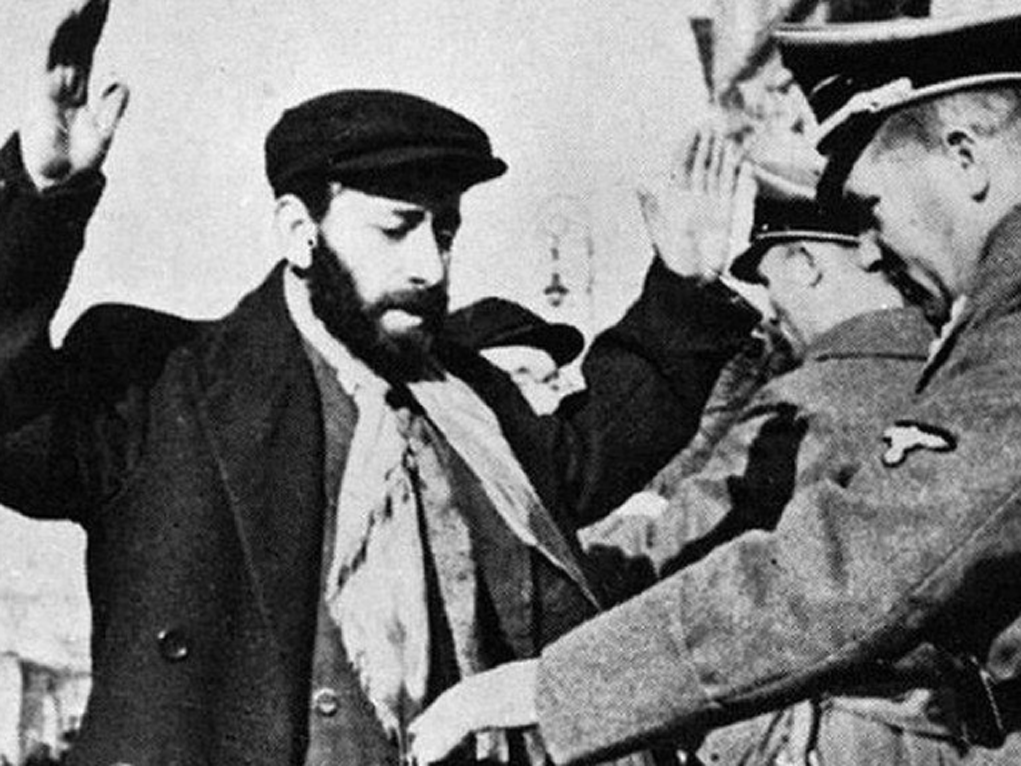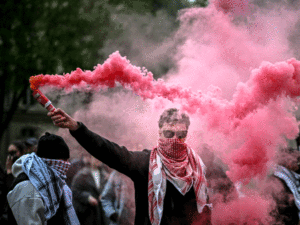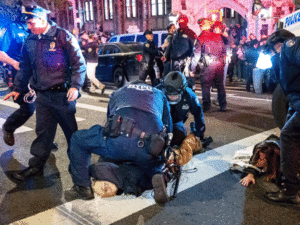Ruling Bolsters Law Seeking To Wipe Polish Atrocities From The Record
A high-profile libel case in Poland has ended with a judge ordering prominent Holocaust historians Jan Grabowski and Barbara Engelking to apologize for a passage in their book, “Night Without End, The Fate of Jews in Selected Counties of Occupied Poland.”
The book is a 1,700-page 2018 study on the role played by individual Poles in aiding the Nazi annihilation of Polish Jewry. The paragraphs at the heart of the libel case document a Polish mayor’s role in the massacre of a group of Jews hiding from the Nazis in the forest outside Malinowo, a small town in Eastern Poland.
According to a survivor cited in the book, the Jews were murdered there after the Polish mayor, Edward Malinowski, betrayed their hiding place to the Nazis. His elderly niece has protested this portrayal, claiming it is historically false and slandered her family’s good name, and that of her uncle “who saved Jews.”
She demanded an apology, retraction and monetary compensation. The judge granted the first two motions, but denied her compensation.
A False Historical
Narrative
The judge’s ruling in the case drew harsh criticism from Jewish groups, and reignited international scrutiny of the controversial 2018 law that made it a crime to blame Poland for taking part in the Nazi extermination of Polish Jewry.
Critics say the Polish law—passed by the ruling Party of Law and Justice—is an intolerable form of censorship that aims to sanitize a wartime history riddled with countless incidents of Polish cruelty and betrayal of the Jews.
Historians Grabowski and Engelking believe the case is part of a government-backed offensive to promote a false historical narrative “of heroic and unimpeachable Polish conduct during the war.”
The Polish government denies any involvement in the libel case. But it helped enable it by amending the law in 2020 to waive court fees for all cases connected with “the struggle of the Polish nation against Nazism and Communism,” wrote the New York Times.
Grabowski and Engelking have said they will appeal the ruling.
“In a normal world this case would have been dismissed long ago,” Professor Grabowski said in an interview. “But Poland can no longer be considered a normal democracy.”
He accused the governing Law and Justice Party of starting a “re-conquest of history” by focusing on Poland’s own suffering during the war, and downplaying its complicity in Nazi crimes against Jews.
Over the last 20 years, Grabowski has pioneered a form of “micro-history” in which he researched hundreds of incidents archived in Warsaw in which Poles are recorded in German documents as having informed the Gestapo about local Jews in hiding.
Death Threats and
Hate Mail
Grabowski says he has received death threats and volumes of hate mail for his books.
The Polish League Against Defamation, which has helped fund the libel case against the historians has had Grabowski in their crosshairs for several years. The group accused him of being a “carrier of lies” in a June 2017 letter sent to the University of Ottawa, where he is a professor, in an attempt to have him fired.
More than 180 Holocaust scholars in the United States and worldwide issued a statement of support for Grabowski, denouncing the accusations as “baseless” and an “attack on academic freedom and integrity.”
The libel case has raised concerns internationally because it comes amid a government-sponsored initiative to present a whitewashed history of wartime Poland as a nation of blameless victims whose conduct was unimpeachable.
In a sign that the case is not an isolated incident, a journalist, Katarzyna Markusz, was questioned earlier this month by police in Eastern Poland about why she had “slandered” the Polish nation, by writing that Polish participation in the Holocaust is a historical fact.
“Will we live to see the day when Polish authorities admit that Poles’ dislike of Jews was widespread, and that Polish complicity in the Holocaust was a fact of history?” the Polish journalist had written.
Jewish leaders in Poland issued a statement last week saying they have seen an intensification of attempts to “repress historians and journalists … who are trying to honestly present the fate of Polish Jews under the occupation.”
The judge’s verdict in the libel case against Grabowski and Engelking did not specifically invoke the Holocaust law criminalizing assertions of Polish complicity. The ruling was widely seen, however, as an attempt to muzzle Holocaust research not to the government’s liking.
The Polish government dismisses claims of Polish crimes against Jews as the actions of a few “criminals” from the margins of society who did not reflect the general population.
Grabowski disagrees. “Individuals were sometimes criminals but very often solid citizens,” he said in an interview. “Once they finished robbing and murdering the Jews they became citizens in good standing once again… without anyone reproaching them for their misdeeds.”
Grabowski is not the first Polish historian to challenge the current government’s narrative. In Poland in 2001, a ground-breaking book by historian Jan Gross, Neighbors: The Destruction of the Jewish Community in Jedwabne (Yadovneh), documents the murder of 340 Polish Jews by local villagers, who locked men, women and children in a barn and burned them alive.
The book generated a firestorm throughout Poland, polarizing a country for whom the annihilation of the Jews was a taboo subject until the fall of communism in 1989.
What is undisputed is that over three million Jews were massacred in Poland. Only 1 percent of Polish Jews survived the Holocaust. Historians explain what all Holocaust survivors attest to from firsthand knowledge: that while genocide was a Nazi plan, the Germans relied extensively on local collaborators in the occupied countries to facilitate the annihilation of Europe’s Jews.
According to Grabowski, even the majority of the 200,000 Jews who escaped the liquidation of their ghettos by hiding, did not survive the war, as they were betrayed or murdered outright by Polish citizens.
“My Father is
Jewish…”
Asked in an interview why he has immersed himself in a field that has sparked so much hostility from his Polish countrymen, Grabowski revealed a very personal dimension to his work.
“My father is Jewish,” he said. “He survived the war by posing as a Christian. But several members of my family were murdered. One of my grandfather’s brothers was murdered one year after the war by Poles who simply did not enjoy seeing a Jew returning to Poland.”
“There are so many layers of lies and propaganda surrounding Jewish-Polish relations during the war,” the historian reflected. “I was raised and educated in Poland, imbued with the belief that Poland was a heroic nation facing terrible persecution, while preserving its virtue. The entire direction of my book goes against that grain.”
“These myths are a festering wound that has to be cleansed,” he added. “I hope my work will help the healing process by facing some truths about Polish complicity so that we can move on.”
According to Grabowski, his father and grandfather went through a terrifying experience under Nazi occupation. A neighbor, knowing the family was Jewish but masquerading as non-Jews, went to the Gestapo to turn them in. In those fearsome days, the betrayal would have led directly to the family’s arrest and execution.
But when the SS officer came to interrogate and arrest Grabowski’s father and grandfather, he realized the elder Grabowski had served with him in the same unit in the Austro-Hungarian army during World War I. On the basis of their earlier connection as comrades in arms, a glimmer of humanity stirred in the Nazi and he vowed not to tell his superiors about the family.
They could never be sure the officer would not have a change of heart, however, and lived in perpetual fear of being arrested.
Jan Grabowski’s father ended up fighting the Germans in the Warsaw Ghetto uprising and surviving the war. His harrowing saga is mirrored in the Holocaust writings of his son, the historian. Between the lines of Grabowski’s meticulously researched work, one senses the author’s stomach turning at the inhumanity of the events he chronicles.
Judenjagn: Hunting Down Jews
Grabowski is best known for his book Hunt for the Jews: Betrayal and Murder in German-Occupied Poland, (Indiana Press 2013) with a Hebrew edition by Yad Vashem in 2016.
Judenjagd was the German term for hunting down Jews who had escaped from the liquidated ghettos in Poland and were trying to hide among the non-Jewish population.
For the book, Grabowski relied on court records from the 1940s in Poland, testimony collected after the war by the Central Committee of Polish Jews, and records gathered by German courts during investigations in the 1960s.
In a 2015 interview, he described the mechanics of the “hunt”:
“The German policy was based on terror. Poles faced the death penalty for any help they gave to Jews. Also, the Germans created a so-called “hostage” system among the Poles. In every community they designated people who would be rotated every couple of weeks. They were responsible for informing the Polish police, or the Germans, about Jews hiding in their towns.”
If a Jew was discovered that had not been reported, the so-called hostages would be harshly punished. Everyone was thus highly motivated to get rid of the Jews.
According to Grabowski, most Jews in hiding were given up by local people to the Polish police or directly to the Germans. He said that Poles were “directly or indirectly” responsible for the deaths of over 200,000 Jews during the Holocaust, not counting victims of the Blue Police—a auxiliary force that took pride in hunting down and murdering Jews.
In a 2018 interview, he said he believed that 60 to 90 percent of the 200,000 had died as a result of actions by non-Jewish Poles.
The Holocaust in Poland was “not only a German-Jewish affair,” Grabowski said. “The assumption that the extermination occurred in outer space, that the Holocaust happened without Polish society actively aware of it, is simply false. … There are no Polish bystanders in the Holocaust.”
“In my work, I stress that without local enablers and facilitators the German genocide would not have been as “efficient,” says Grabowski. “This part of the story –the Polish context—has never been told. We – historians of the Shoah – owe it to the victims and to the present readers alike.”
“When you tell the history of the Holocaust, it’s a commitment,” added the historian. “I have an obligation to the dead.”
Can Poland Pull Off A Whitewash Utilizing the Courts to Censor Speech?
“Night Without End” focuses of the fates of many of the Jews who escaped as the Nazis were liquidating ghettos and sending inhabitants to extermination camps, and tried to hide.
It was a crime punishable by death to shelter Jews in Nazi-occupied Poland. Polish rescuers were “a tiny, hunted terrified minority” afraid of being exposed by their neighbors, writes Grabowski. Those who were discovered sheltering Jews were publicly executed along with their entire families.
But the historians present extensive evidence of individual Poles who were not under any duress who willingly collaborated in betraying Jews to the Nazis.
In the episode that lies at the heart of the libel case, the book quotes testimony from a Holocaust survivor who in 1996 told the Shoah Foundation that Mayor Edward Malinowski had betrayed the whereabouts of a group of 22 Jews to German soldiers. The group was subsequently massacred.
The mayor’s elderly niece who sued the historians argued that the authors had failed to mention that a post-war trial had acquitted her uncle of the charge of collaboration with the Nazis. Key to his acquittal was favorable testimony from the same Jewish witness who later implicated him in the massacre.
Grabowski responded that the earlier, post-war trial testimony was tainted by fear of hooligans who had intimidated and in some cases beat the witnesses.
Critics say the conflicting claims about what actually happened belong to the provenance of historical research, and that courtrooms should have no jurisdiction over the matter.
“Prosecuting researchers and journalists instead of pursuing academic discussion as is the norm throughout the world, constitutes a real threat to academic and press freedom,” Yad Vashem said in a statement.
Can Poland pull off a rewrite of history utilizing the courts to censor “wrong memory codes” as the government has referred to negative images of Polish conduct in the Holocaust-era?
Allowing courts to punish respected experts for their opinions is the hallmark of a totalitarian state and will inevitably lead to tyranny and oppression, say critics.
The Polish Blue Police Left
Records of Their Atrocities
For his book, Hunt For The Jews: Betrayal and Murder in German-occupied Poland, Grabowski spent years combing through Polish archives from the Holocaust and post-Holocaust period, and conducting interviews with survivors.
This is how he stumbled across the little-known chapter of the catastrophe Polish Jews suffered at the hands of the Polish “Blue Police,” savage killers identifiable by their bright blue uniforms.
These vicious Jew-haters were equipped as a paramilitary force by the Nazis with weapons and ammunition, and allowed to operate continuously in several Nazi-occupied lands.
In the 2016 Annual Ina Levine lecture at the US Holocaust Museum in Washington, Grabowski noted that besides the Nazis themselves, the Polish Blue Police were the deadliest armed force in the program of extermination.” They paralleled the German einsatzgruppen in their subhuman cruelty and efficiency.
Much of the information the historian presented came from reports archived in Warsaw that were penned by eyewitnesses and at times by the members of the Blue Police, themselves. Frozen in time, these blood-chilling reports indict the perpetrators as no other evidence could.
Grabowski’s lecture, “Polish Police: Collaboration in the Holocaust” describes events in hundreds of ghettos in Poland where “liquidations followed a horrible pattern—one in which the Blue Police, firefighters, so-called ‘bystanders’ and even children had a role to play…”
Excerpts from the lecture follow below.
The Martyred Jews of Bilgoraj, Wegrow and Wodzislaw
“The ghetto in Bilgoraj, fifty miles south of Lublin, was liquidated on November 2, 1942,” noted Grabowski. “Jan Mikulski, a Polish forester, described what he saw there as he was on his way to the bank.”
‘[I saw] many bodies of women and children lying in the streets, in the gardens and on the squares. Wiesiolwski, the commander of the Polish police, surrounded by scores of kids aged 6 to 12, searched the attics, cellars, and sheds. For each Jewish child brought to him he gave the [Polish] kids sweets. He grabbed the small Jewish children by the neck and shot them through the head with his small-caliber revolver.’
“On the day of the aktion in Wegrow, the German-Ukrainian Liquidation Force, with the assistance of the Blue Police, local firefighters and bystanders murdered more than 1,000 Jews in the streets of the city.
“Another 8,000 Jews were marched to the Sokolow railway station, eight miles distant, and delivered to Treblinka,” another report by the Blue Police reads.
The mayor, a Pole named Okulus, was tasked with overseeing the removal of dead bodies from the streets. He made the following note, according to Grabowski. “The removal of the bodies had already started. There were carts and people were ready, they volunteered for the job without any pressure. Our hyenas were after Jewish clothes, footwear and the cash that might be found on the dead.”
When the Liquidation Force left Wegrow the following day, more than a thousand Jews remained hidden inside the ghetto, according to Grabowski. In the subsequent days and weeks, the Polish Blue Police and the local firefighters hunted down most of them. They either killed these Jews themselves, or delivered them to the German gendarmes for execution.
While Jewish Wegrow ceased to exist, the Jews of Wodzislaw, a small town halfway between Kielce and Cracow, were still clinging to hope. Their ghetto had a population of close to 4,000. There were no Germans to speak of in Wodzislaw, attests Grabowski; the forces of order were represented by the local Blue Policemen.
The records of the Polish Blue Police, noted Grabowski, testify that a full contingent of this force was involved in the mass murder of 90 per cent of the Jews of Wodzislaw. In a report to Nazi authorities requesting additional bullets to replace the “36 bullets fired during the Aktion,” platoon leader Jozef Machowski notes his role in this slaughter.
Machowski’s report—later used to convict him in a 1949 trial for war crimes–reads: “I request a fresh supply of ammunition for the local detachment of the Polish Police. The bullets were fired against Jews by the officers of this police station during the most recent deportation of Jews from Wodzislaw. [The officers’] names follow.”
Eyewitness: Murder in Lopianka
Grabowski’s lecture turned to events in June 1943, eight months after the liquidation of the last small ghettos in Poland and during the period of the so-called Judenjagd, or “hunt for the Jews.”
He quoted from the testimony of eyewitness Waclaw Chomontowski: “I saw with my own eyes how [Blue Police] Officer Matusiak executed four Jewish boys in the village of Lopianka. Once he had shot the Jews, he told me and the others to dig a grave… When we laid them into this ditch, one Jew, who had only been wounded, started moaning and pleading: ‘Officer please, have mercy, finish me off!” to which Constable Matusiak responded, ‘You are not worth a bullet.”
The killings of Jews in Lopianka occurred without any German presence or direct involvement, attests Grabowski, based on eyewitness reports in the post-war prosecutions of the Blue Police officers.








